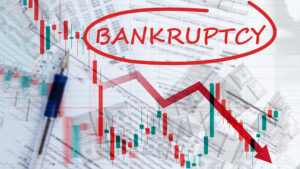“Bounces in bankrupt companies have gone from bizarre to routine.”
“As long as there are buyers willing to play musical chairs with [a bankrupt] stock, hoping to trade it from the long side for a profit until the shares are delisted after being declared truly worthless by the bankruptcy court, we’ll see this type of behavior[.]”
These were among the quotes that I offered to a reporter last week when she reported on the jump in WeWork (WEWKQ) shares in the aftermath of its bankruptcy declaration. The same sort of social media spirit that led to outsized bounces in meme stocks has led to similar types of jumps in stocks after they announced their Chapter 11 filings. While it is entirely possible for nimble traders to surf the waves in low priced stocks that are under bankruptcy court protection, it is important for traders to understand that the fundamental value of the common stocks in most of these companies is zero. Nil. Zilch. Nada.
This is not my opinion — this is a fact of how bankruptcy law works.i There are two basic types of corporate bankruptcy filings: Chapter 7 and Chapter 11. In the former, the company’s assets are liquidated. In the latter, which is more common (the type of filing used by WEWKQ), the company attempts to restructure its obligations while continuing to operate under court supervision.
In all corporate bankruptcies there is a basic premise that one must keep in mind. If the bondholders won’t get paid, the stockholders almost certainly will get nothing. Bankruptcy is about the orderly discharge of debts, and debtholders sit above equity owners when a company must be unwound. This is evident in the way that equity exists on a company’s balance sheet. It is the net of total assets minus total liabilities. If a company’s assets exceed its liabilities, then there is positive equity (“book value”). If liabilities exceed assets – the type of thing that causes companies to declare bankruptcies – then the company has negative equity. Negative equity means that there is nothing left for shareholders.
In the case of WEWKQ, they were quite explicit about the value of the common stock. From the Form 8-K that announced its filing:
- Each holder of equity interests in the Debtors shall have such equity interests cancelled, released, discharged, and extinguished and shall not receive any distribution on account of such interests.
That is about as clear as one can declare, in legalese, that the company believes its stock to be worthless.
In case you doubt this, a simple check of the company’s bond prices will offer a market-based assessment. Remember, bond investors care almost exclusively about whether or not they will get paid back. Keep in mind as well that the prices for distressed debt are set by cadres of well-paid, well-advised, and highly experienced investors. The WeWork 7.875% bonds expiring on May 1, 2025 are trading at 0.500, or one-half cent on the dollar. The experts who trade the bonds are telling us that they are virtually worthless. Again, if the bonds are worthless, so must be the stock.
Anyone on social media who asserts otherwise is either extraordinarily mis-informed or trying to play you for a fool. In my experience, both types of people exist there. When JCPenney went bankrupt, and I commented that the bonds were trading at one cent on the dollar, meaning that the stock would ultimately be worthless, all sorts of bullish investors told me on social media – not particularly politely – that I was wrong. Spoiler alert, I wasn’t. From the final 8-K of the successor, Old Copper Company (in bold in the original document):
As a result, as of the Effective Date, among other things, all of the Company’s equity interests, consisting of shares of common stock and related preferred stock repurchase rights, were cancelled without consideration and have no value.
It would seem as though this should be a layup short bet – shorting a worthless company that should be destined for zero – but it is not. Remember, there are very specific risks to short-selling, especially when the stock is trading for just over a dollar. For starters, one’s risk/reward is highly skewed. The short-seller is hoping to make a bit more than a dollar while leaving himself exposed to infinite upside – even if temporary. And quite importantly, it is very expensive to borrow WEWKQ. The rate is volatile and has been climbing recently – somewhere between 600% and 1,000%. That means that there is heavy demand to short the stock, and consequently there are social media wags who do their best to stoke periodic squeezes. This is a relatively recent phenomenon, born during the meme-stock frenzy of 2021 and pursued, sometimes profitably, since.
But the mechanics of the stock lending process can give the stock some value in the interim. Depending upon how long the reorganization takes, it could cost more to borrow the stock than one could expect to profit from the stock’s decline. On the flip side, if you own the stock with a broker who passes along much of the rebate, it could end up being profitable to own the shares even if they are heading to zero. But if you choose to own shares under that rationale it is an implicit bet on the speed – or lack thereof – in the bankruptcy process. That is the root of the “musical chairs” comment. It can be fun to play the game, but ultimately it will end with the last owners standing around.
—
i What follows is by no means legal advice. I am not a lawyer, nor do I pretend to be. The oversimplified explanation stems from a practical understanding of bankruptcy law from years of investment experience, not formal legal training.
Join The Conversation
If you have a general question, it may already be covered in our FAQs. If you have an account-specific question or concern, please reach out to Client Services.
Leave a Reply
Disclosure: Interactive Brokers
The analysis in this material is provided for information only and is not and should not be construed as an offer to sell or the solicitation of an offer to buy any security. To the extent that this material discusses general market activity, industry or sector trends or other broad-based economic or political conditions, it should not be construed as research or investment advice. To the extent that it includes references to specific securities, commodities, currencies, or other instruments, those references do not constitute a recommendation by IBKR to buy, sell or hold such investments. This material does not and is not intended to take into account the particular financial conditions, investment objectives or requirements of individual customers. Before acting on this material, you should consider whether it is suitable for your particular circumstances and, as necessary, seek professional advice.
The views and opinions expressed herein are those of the author and do not necessarily reflect the views of Interactive Brokers, its affiliates, or its employees.



























On my IB account I can’t buy WE, only sell. So who’s buying?
Well explained
Nothing makes us happier than satisfied customers!